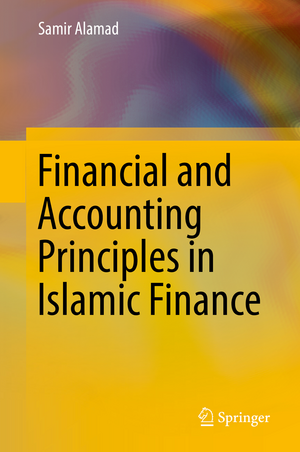Financial and Accounting Principles in Islamic Finance
Autor Samir Alamaden Limba Engleză Hardback – 22 mai 2019
Preț: 791.40 lei
Preț vechi: 965.12 lei
-18% Nou
Puncte Express: 1187
Preț estimativ în valută:
151.45€ • 157.54$ • 125.03£
151.45€ • 157.54$ • 125.03£
Carte tipărită la comandă
Livrare economică 14-28 aprilie
Preluare comenzi: 021 569.72.76
Specificații
ISBN-13: 9783030162986
ISBN-10: 3030162982
Pagini: 350
Ilustrații: XXVII, 354 p. 49 illus., 5 illus. in color.
Dimensiuni: 155 x 235 mm
Greutate: 0.71 kg
Ediția:1st ed. 2019
Editura: Springer International Publishing
Colecția Springer
Locul publicării:Cham, Switzerland
ISBN-10: 3030162982
Pagini: 350
Ilustrații: XXVII, 354 p. 49 illus., 5 illus. in color.
Dimensiuni: 155 x 235 mm
Greutate: 0.71 kg
Ediția:1st ed. 2019
Editura: Springer International Publishing
Colecția Springer
Locul publicării:Cham, Switzerland
Cuprins
Chapter 1 Introduction: The Basics of Islamic Economics and Finance.- Chapter 2 Money, Its Origins, Nature and the Time Value of Money.- Chapter 3 An Analysis of Paper Money and the Concept of Multi-Genus Banknotes.- Chapter 4 The Origins of Accounting in the Islamic Economics and Finance System.- Chapter 5 Islamic Financial Instruments: Accounting of Equity-Based Contracts.- Chapter 6 Islamic Financial Instruments: Accounting of Sale-Based Contracts.- Chapter 7 Islamic Financial Instruments: Accounting of Debt-Based Contracts.- Chapter 8 Islamic Financial Instruments: Accounting of Charitable Contracts.- Chapter 9 Technical Analysis of the International Financial Reporting Standard 9.- Chapter 10 Technical Analysis of IFRS 9 Application to Sukuk.- Chapter 11 Internal Capital Adequacy Assessment in IFIs.- Chapter 12 Liquidity Assessment, Recovery and Resolution Strategies in IFIs.- Chapter 13 Stress Testing Methodologies for Islamic Finance.- Chapter 14 Conclusion.- Index.
Notă biografică
Samir Alamad is a senior professional and expert in the Islamic banking and finance industry, an economist and a published author. He holds a PhD degree from Aston University Business School. Currently, he is the head of Sharia compliance and product development at Al Rayan Bank. He is also an AAOIFI Certified Sharia Advisor and Auditor (CSAA) and a visiting lecturer at various universities.
Textul de pe ultima copertă
This book provides an original account detailing the origins and components of a faith-based accounting system that was founded around 629 CE. By examining the historical development that the accounting systems underwent within the context of faith-based rules and values, the book explains what is meant by the term “faith-based accounting”, together with a discussion of its characteristics in relation to various product structures and the underlying Islamic finance principles. It provides important theoretical and practical contributions by explaining accounting as a value-based science rather than a value-free object or abstract. This book explores the way in which religious rules act as a directive for accounting and auditing practices in IFIs. Through which the concept of money and digital currency within the theory of money and how it is enacted in a faith-based context, amid differences of opinions among its actors, is examined. This is an important foundation to explain Islamic accounting and includes how this outcome would shape the faith-based view regarding the new phenomenon of digital currency (DC). Also featured is the concept of paper money within the theory of money and how it is enacted in a faith-based legal framework by identifying two core concepts of today’s Fiat money as being a single genus or multi-genera money. This book is not merely an academic work, nor is it a pure practitioner guide; rather, it is a robust work that combines both. It marries rigorous academic research and theories with practical industry experiences. The book provides a clear and concise guide to accounting in Islamic economics and finance and how Islamic financial institutions could meet the applicable faith-based rules in their accounting practices.
Caracteristici
Provides the reader with a comprehensive account of what constitutes accounting principles and what are these principles in Islamic Financial Institutions Explains the role of religious rules in the financial accounting and reporting processes and how this role is enacted Explores the specific financial accounting requirements for each Islamic finance principle and the financial products based on them
